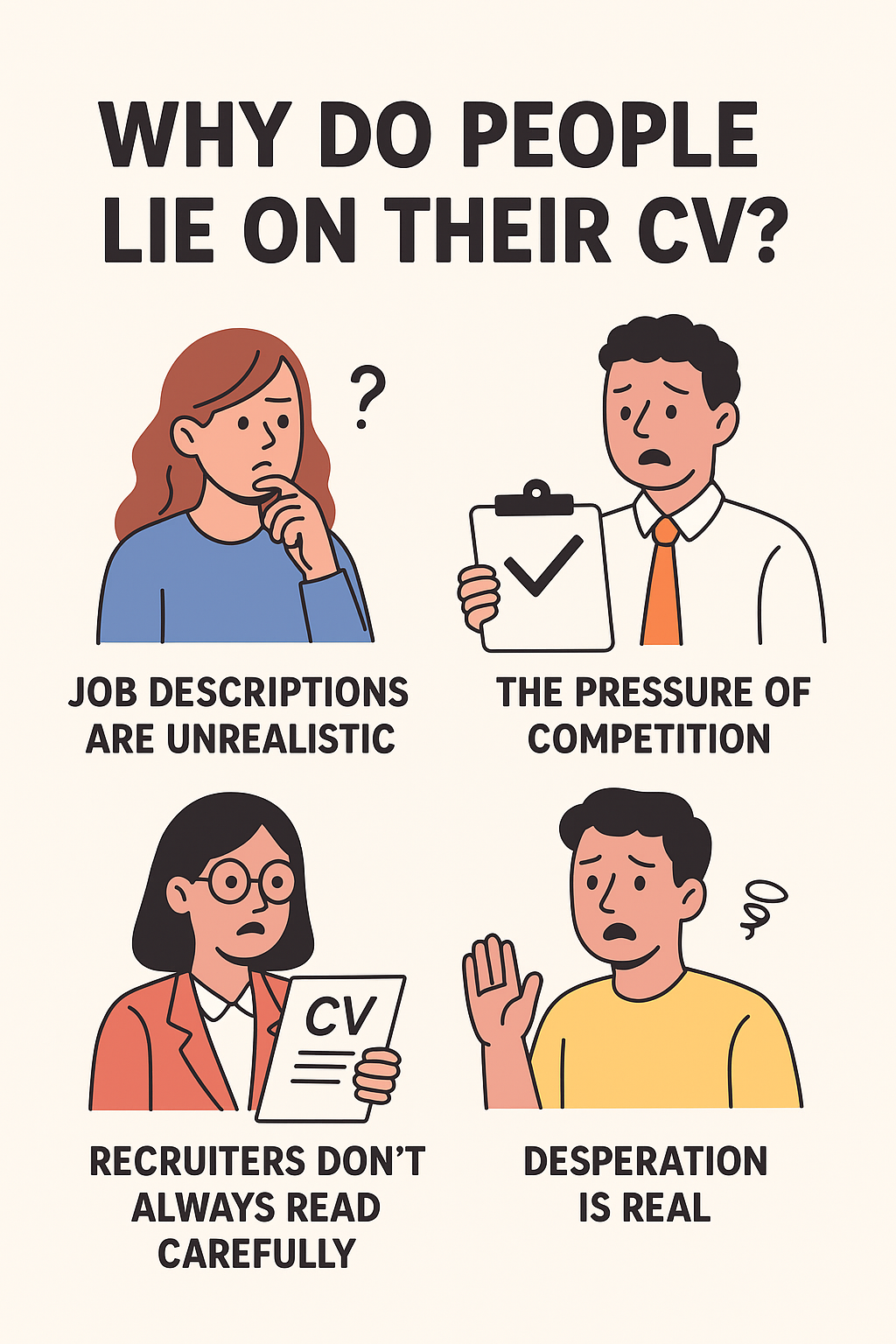This question comes up more often than we admit. Every recruiter, HR professional, or hiring manager has probably asked it in frustration. But here’s the truth: people don’t just lie on their CVs because they “enjoy being dishonest.” Most times, it’s survival.
Let’s dig into it.
1. Job descriptions are unrealistic
Have you noticed how some job ads sound like they were written for a superhero?
“Entry-level role… must have 5 years’ experience.”
“Graduate position… must be a proven leader.”
“Marketing assistant… must be skilled in design, coding, strategy, data analysis, and social media trends.”
When the bar is set that high, candidates feel cornered. They think, If I don’t stretch the truth, I won’t even be considered. And so, exaggeration begins.
2. The pressure of competition
The job market is brutal. For one vacancy, hundreds—even thousands—apply. Everyone is told to “stand out,” but how?
Some people polish their CVs until it no longer reflects reality. They add fake certifications, extend their years of experience, or inflate their job titles. Not always because they’re lazy or unqualified, but because they believe everyone else is doing the same thing.
And here’s the bitter truth: sometimes, the ones with the “perfect” (edited) CVs get shortlisted while the honest ones don’t.
3. Recruiters don’t always read carefully
We can’t ignore this. Many recruiters and hiring managers use ATS (Applicant Tracking Systems) that scan for keywords. If your CV doesn’t contain those magic words—even if you can actually do the job—you’re invisible.
That’s why people copy and paste keywords into their CVs even when they haven’t fully mastered those skills. For some, it’s a lie. For others, it’s “playing the game.”
4. Desperation is real
Let’s be human for a second.
Not everyone has the luxury of waiting months for the “perfect fit.”
For some people:
Bills are waiting.
A visa is expiring.
Kids need school fees.
Rent is due.
If bending the truth on a CV gets them through the door, many will take the risk. Is it wrong? Maybe. But can we really say we wouldn’t do the same if survival was on the line?
5. Is it lying… or is it “selling yourself”?
Here’s where it gets interesting.
Think about interviews. Most of us present the best version of ourselves. We dress up, choose words carefully, highlight achievements, and downplay weaknesses. Isn’t that a kind of performance too?
So where’s the line?
If someone says they’re “proficient” in Excel but only knows the basics, is that a lie—or confidence?
If someone calls themselves “Manager” when their official title was “Assistant Manager,” but they were actually leading the team, is that lying—or reclaiming credit?
Some people argue: As long as you can do the job, the packaging shouldn’t matter.
Others say: Honesty is non-negotiable, because trust matters more than skills.
6. The risk of lying
Here’s the catch: lies have short legs.
Employers cross-check references, look up LinkedIn profiles, and sometimes even ask technical tests. If your CV doesn’t match your actual capacity, the truth will come out.
And when it does, the damage is bigger than not getting the job—you lose trust, credibility, and your reputation takes a hit.
7. The alternative: reframing, not lying
Instead of lying, what if candidates learned how to reframe their experiences?
For example:
Instead of saying “3 years’ project management experience” when you don’t, you can say:
“Coordinated and delivered multiple team projects within tight deadlines, demonstrating strong project management skills.”
Instead of inventing a job title, describe the impact:
“Led a 5-person team to deliver marketing campaigns that increased engagement by 30%.”
The truth—packaged with confidence—can be just as powerful as exaggeration.
8. The bigger question
So let’s stop pointing fingers at candidates who lie and start asking:
👉 Why do people feel forced to lie in the first place?
👉 Are companies setting expectations that make honesty look like failure?
👉 Should the recruitment process change to value potential over “perfect CVs”?
Final thought
Here’s the controversial take:
Maybe lying on a CV is not always about dishonesty. Sometimes, it’s about survival. Sometimes, it’s about navigating a broken system.
But here’s the challenge to job seekers:
Don’t underestimate your real story. Don’t shrink your journey. Don’t assume your truth is not enough. Because while lies might open a door, they rarely help you stay in the room.
Now I’ll throw the mic back to you:
Do you think lying on a CV is always wrong… or is it just a survival strategy in today’s job market?








